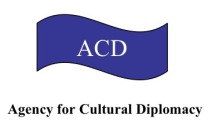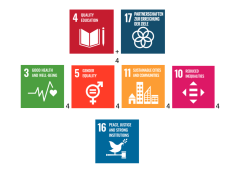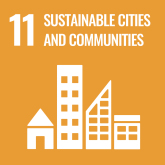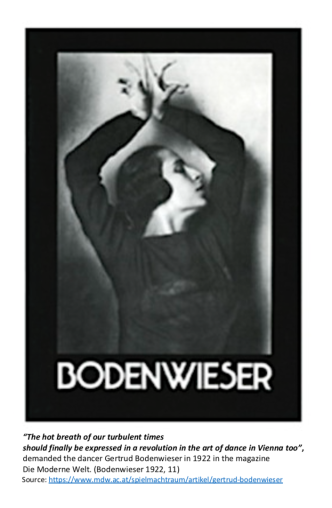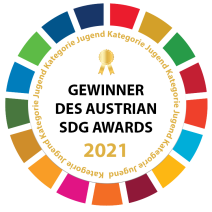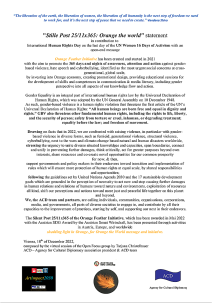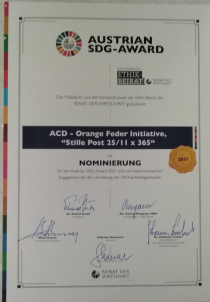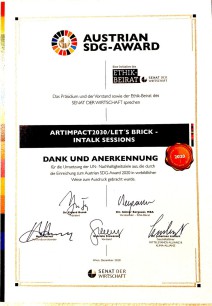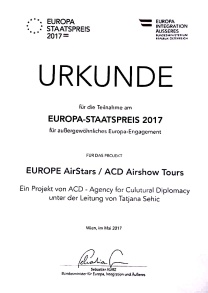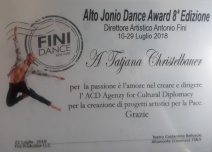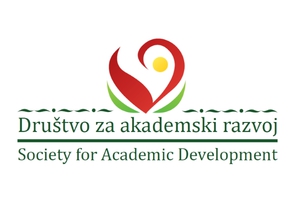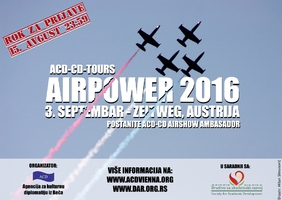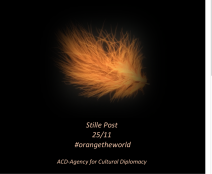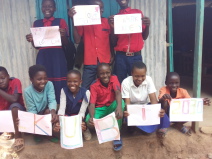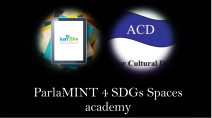eviDance2030 platform and project series are grounded in the perception of dance arts as a form of
cultural diplomacy in the current sustainable development process, in particular, its contemporary practices connected with the United Nations Sustainable Development Goals (17 UN
SDGs),
spotlighting the engagement of professionals from dance arts in the current debates and endeavors toward the improvement of quality education (SDG4),
gender-related legal conditions (SDG5, SDG10), working conditions (SDG 8 decent work), health & well-being (SDG3), contributes to protect and safeguard the world’s cultural and natural heritage
(SDG 11.4), and above all its contribution to more just and peaceful world (SDG16)through international collaborations and partnerships (SDG 17).
Guided by questions:
How can international collaborations contribute to the promotion and protection of dance arts as listed by UNESCO under the banner of intangible cultural
heritage?
What impact can international competition with a collaborative approach have on the professional development of ongoing and professional dance artists,
producers, and other engaged professionals?
Dance arts as a form of cultural diplomacy toward 2030: how can international collaborations in dance arts support the current sustainable development process
and the realization of the 17 UN SDGs?
Examples can be shared by referring to the following effects:
1) effects on the improvement of the quality education SDG4 (such as improvement of teaching methodology, technical training, resilience, community outreach-
audience development by inclusive workshops, collaboration with formal educational institutions, cultural communities, universities, business corporations, policymakers…)
2) effects on working conditions SDG 8 (such as improvement of transversal skills, development of further career opportunities, enabling higher rate in the
financial contracts through international engagement, …)
3) effects on health & well-being SDG3 (such as gaining more quality professional training for dance arts students and professionals in collaboration among
internationally recognized pedagogues, scientists, and research institutions, as well as supporting local communities and formal educational institutions, hospitals, health care providers, and other
entities through cross-sectoral projects, engaging into the improvement of health insurance and wellbeing conditions for retired dance arts professionals, and actively engaged self-employed dance
arts teachers and performers …)
4) effects on international relations SDG16 (political stage, building international bridges, creating space for intercultural dialogue and collaboration with
Embassies, Ministries through dance arts ..)
5) effects on the improvement of the gender equality SDG5, SDG16, SDG10, prevention of violence (such as by referring to socio-emotional aspects in dance arts
education, development of leadership skills, collaborative competencies, intercultural communication competencies, sensitivity for diversity and above all, humility and modesty, a.o.
virtues;
6) effects on the improvement of the economic conditions in the creative industries / creative economy, orange economy (SDG8);
7) effects on preservation and the world cultural heritage SDG11 (keeping the legacy from dance arts methodologies, repertory, and history, alive by adapting,
further developing, practicing, and promoting its sources nowadays
More in-depth…
Drawing on facts that,
Arts in general are an integral part of the United Nations agenda 2030 and dance arts have been recognized by UNESCO and listed under the banner of the intangible
cultural heritage,
referring to the WHO report art&health form 2019 on the effectiveness of dance arts in health, care & well-being settings,
our teams are promoting and advocating for dance arts practice through interactive, participative, and integrative learning opportunities, which enable
multi-sensorial experiences and a variety of expressional forms, support and initiate relevant activities in contribution to the realization of the UN Sustainable Development Goals at the local,
European and international scale;
initiating and supporting the development of collaborative projects in education, science, and research on health and wellbeing; engaging in and initiating
gender-related debates, research, and project activities at cross-generational and cross-sectoral scales, creating media campaigns and promotional product design, among other
activities;
initiating and supporting the development of collaborative projects in education, science, and research on health and wellbeing; engaging in and initiating
gender-related debates, research, and project activities at cross-generational and cross-sectoral scales, creating media campaigns and promotional products design, among other activities; encouraging
decent work by promoting inclusive and sustainable economic growth through employment in culture and creativity (KuBiPa2030 project)
Webpage: https://www.acdvienna.org/careers-services/
The first comprehensive report on evidence of Arts for health has been launched by the World Health Organisation Europe (WHO) in 2019:
“The examples cited in this groundbreaking WHO report show ways the arts can tackle ‘wicked’ or complex health challenges such as diabetes, obesity, and mental
ill health. They consider health and well-being in a broader societal and community context and offer solutions that common medical practice has so far been unable to address effectively,” Dr. Östlin
explains.
Sources: https://worlddanceheritage.org/international-heritage/ , https://ich.unesco.org/en/performing-arts-00054)
Furthermore, dance arts are often key features of cultural promotion intended to attract foreign audiences, investors, tourists, and also politicians. Dance
Art contributes to creating a pleasant atmosphere for meetings, but can also deliver symbolic messages with critical content, widen perspectives and opportunities to meet, collaborate, unify in the
diversity of expressions and find in common in complementarity.
Source: https://www.acdvienna.org/acd-dance-arts/, https://en.unesco.org/creativity/sites/creativity/files/passeport-convention2005-web2.pdf
The evidence of dance arts in sustainable development discourse has been recognized by UNESCO and has been included in the UNESCO document “Towards 2030:
creativity matters for sustainable development”
Source: https://unesdoc.unesco.org/ark:/48223/pf0000246746
Creative economy:
Creative industries and cultural infrastructure are valuable resources for generating livelihoods. The cultural and creative sector accounts for 3.1 percent of
the global gross domestic product (GDP) as of 2022, according to a recent report by UNESCO. This rapidly growing sector generates nearly 30 million jobs worldwide and accounts for 6.2 percent of all
employment.
According to data from a study of 35 low- and middle-income countries surveyed by UNESCO, more women than men are employed in cultural work in over half of these
countries. In Sri Lanka, 12 percent of the female workforce is engaged in a cultural occupation compared to 3 percent of male workers.
The creative and cultural sector can serve as a powerful means of advocacy, empowerment, and social inclusion, especially for marginalized and vulnerable
communities. Several studies have shown that an arts education has a positive effect on the self-esteem of at-risk youth and enhances their resilience. It also enables those struggling with mental
health and social issues to build relationships and engage positively with others in their communities.
(WHO Report 2019 arts&health)
The Orange Economy shows tremendous promise, with governments across the world. For example, Colombia,
having seen the sector's value grow from $6.2 billion in 2010 to $8.2 billion in 2017—at an average annual growth rate of 5.5 percent—launched its “Orange Economy” policy in 2018 to stimulate private
sector investment in creative and cultural industries.
´Cultural and creative industries are major drivers of economies by capitalizing US $2,250 billion and creating 29.5 million jobs globally. In addition to
economic benefits, the cultural and creative industries also generate merit to people-centered value, sustainable urban development, and development of creativity and culture, and contribute to the
achievement of the 2030 Agenda.
At the same time, creativity and culture also have a significant non-monetary value that contributes to inclusive social development, dialogue, and understanding
between peoples. Culture is both a driver and an enabler of human and sustainable development. It empowers people to take ownership of their own development, and stimulates the innovation and
creativity which can drive inclusive and sustainable growth.´
Source: https://www.sdgfund.org/creative-industries-and-sustainable-development
Dance arts education and professional practice is included in worldwide endeavors toward the improvement of gender equality and in the prevention of the worldwide
raising of gender-based various forms of violence.
Source: https://balletrising.com/2021/02/09/namibia/
In 2022, the ACD-association Orange Feather Initiative which was started with the aim to provide dance arts-based educational sessions in contribution to the
prevention of violence, in particular gender-based and structural violence, was awarded the Austrian SDG Award by the Austrian Economic Senat.
EviDance2030, Diplomacy on stage
inTalk sessions and project activities
About
EviDance2030 platform has been created within the ACD-initiative artImpact2030 & ACD-dance arts2030 with an aim to open space for collaborative engagement of actors engaged in dance arts by collecting and documenting and promoting
good practices, connected with the 17 UN SDGs, deriving from the dance arts sector.
Webpages: https://www.acdvienna.org/artimpact2030-initiative/, https://www.acdvienna.org/acd-dance-arts/
Diplomacy on stage is the event format that also serves as a hybrid dialogue platform
for representatives from international cultural institutes, embassies, international institutions, universities, and cultural associations with artists/cultural workers from Vienna|Austria, with
guests and partners from home and abroad. It has been launched in 2017, for the first ACD-anniversary celebration at the Vienna Diplomatic Academy
Webpage: https://www.acdvienna.org/vienna-meets/
The open stage includes presentations in the form of performance lectures, policy documents in Talk, diverse forms of artistic performances connected with the
current global sustainable development policy communication and its implementation with activities created, led, and organized by art professionals in collaboration with scientists, diplomats, and
other entities.
The inspiration for the title “Diplomacy on stage” has been found in the Festival format Philosophy on stage created by Univ. Prof. Dr. Arno Böhler
Motto: Art beyond entertainment, diplomacy on stage
Purposes:
Supporting the 21st cent. skills development of art students and professionals, transparency on artistic contribution to Cultural Diplomacy at the national,
European, and global level, grounded in the understanding of culture and its role as the definition of culture as a “set of distinctive spiritual, material, intellectual and emotional features that
characterize a society or social group, [which] includes not only arts and letters but also modes of life, the fundamental rights of the human being, value systems, traditions and beliefs”, which
laid the ground for the development of UNESCO’s normative action, notably the 2001 Universal Declaration on Cultural Diversity, acknowledging cultural diversity as “a source of exchange, innovation,
and creativity, [...] which is as necessary for humankind as biodiversity is for nature”;
Source: UNESCO World Conference on Cultural Policies and Sustainable Development – MONDIACULT 2022 (28-30 September 2022, Mexico City) Final
Declaration
How we do so:
1. linking archives, connecting on the pulse of time (Bodenwieser-Mandukic modern dance team SDG11, SDG
5, SDG4 for 3); Ballett2030 (in development): classical ballet on the pulse of time; dance meditations & embodiment sessions; contemporary ballet dance arts media
platform and project activities
2. art4health programs, projects, workshop sessions with dance arts, and music professionals in health care
settings (SDG3, SDG4, SDG5) such as d.a.4h, Zalike2030
3. Orange economy world network arts4orangetheworld: an online platform for the development of strategic
partnerships in the creative economy
4. ArtImpact2030 and Arts_Sciences_CulturalDiplomacy2030 platforms: mapping, documenting, promoting good
practices from dance arts on the interface with sciences & diplomacy toward 2030 …
5. Investing in the prevention of gender-based violence through educational programs, promotional design, and media campaigns in partnership with international
organizations and ACD ambassadors: Orange Feather Initiative
6. Launching Open calls for internships, participation in ACD-led projects and events, attendance in the UN, UNESCO, UNECE -led events, and report writing on ACD
activities and policy recommendations
7. collaboration with the European science Diplomacy Alliance, IIASA & Citizen science platform with Universities and independent researchers in Austria and
worldwide; connecting arts, science diplomacy sustainability policy communication
8. Attending, supporting, and organizing dance arts events and projects, attending, creating, and leading art2030 panels, publishing expert interviews on relevant
topics, .., organizing Diplomacy on stage ^ diplomatski teatar panel sessions, conferences, and performance lectures
economic pillar
the project is currently supported by private investments of the ACD-founding team
circular economy, green financing:
envisioning sustainable development of the project and its activities, the ACD team and partners are inviting individuals and entities interested in applying for
Citizen science project funds, HORIZON Europe, European Cultural Desk, ERASMUS+ projects, inviting donators and sponsors, collaboration with local governmental and non-governmental institutions,
art7cultural institutions, communities, international organizations such as UNESCO, Embassies, business corporations, universities, media ...
By Your interest to take part in the intalk session and support the development of the EviDance2030- platform, please contact our team via
E-mail:
info@acdvienna.org, add the note: EviDance2030
September 2022

